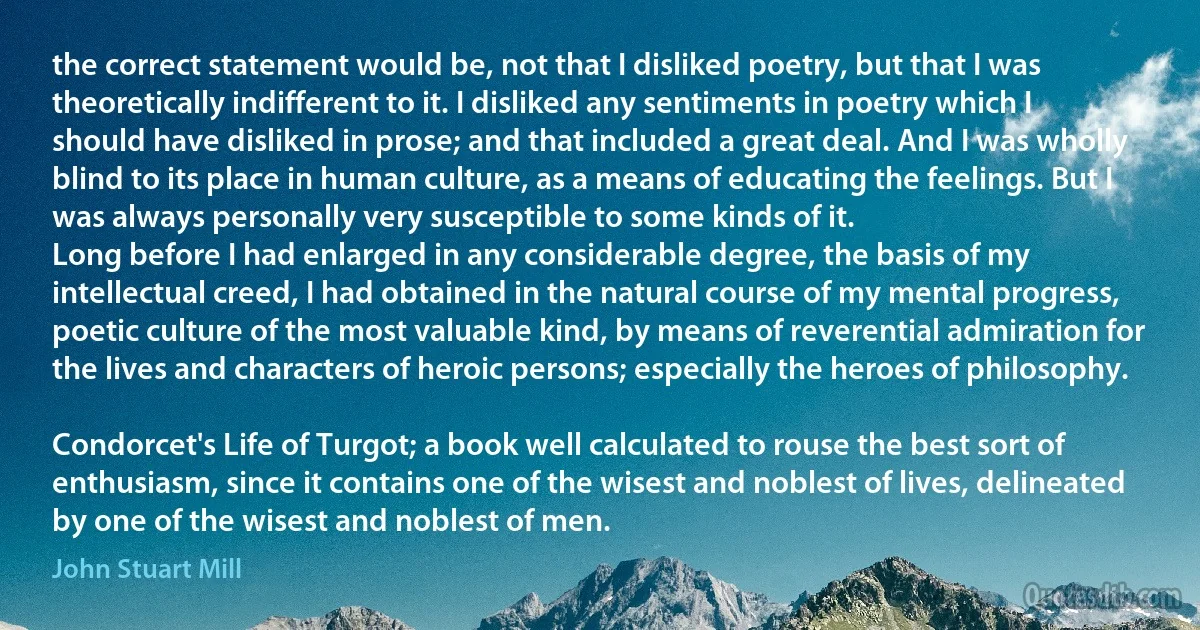
the correct statement would be, not that I disliked poetry, but that I was theoretically indifferent to it. I disliked any sentiments in poetry which I should have disliked in prose; and that included a great deal. And I was wholly blind to its place in human culture, as a means of educating the feelings. But I was always personally very susceptible to some kinds of it. Long before I had enlarged in any considerable degree, the basis of my intellectual creed, I had obtained in the natural course of my mental progress, poetic culture of the most valuable kind, by means of reverential admiration for the lives and characters of heroic persons; especially the heroes of philosophy. Condorcet's Life of Turgot; a book well calculated to rouse the best sort of enthusiasm, since it contains one of the wisest and noblest of lives, delineated by one of the wisest and noblest of men.
John Stuart MillRelated topics
best blind book correct course creed deal degree great hero heroic human intellectual men kind lives life natural place rouse should sort susceptible valuable well meansRelated quotes
For a period of roughly 35 years, Keynesian theory provided a central paradigm for macroeconomists, and considerable progress was made on several empirical fronts. It was widely recognized that some of the ingredients of Keynesian economics (e.g. money illusion and/or nominal wage rigidity) rested on slender to non-existent microtheoretic foundations; and there were always dissenters. But, thought of as a collection of empirical regularities that fit together into a coherent whole, the theory worked tolerably well. In the 1970s, however, the Keynesian paradigm was rejected by a great many academic economists, especially in the United States, in favour of what we now call new classical economics. By about 1980, it was hard to find an American academic macroeconomist under the age of 40 who professed to be a Keynesian. That was an astonishing intellectual turnabout in less than a decade, an intellectual revolution for sure.

Alan Blinder
The Mahomedan or Islamic culture hardly gave anything to the world which may be said to be of fundamental importance and typically its own; Islamic culture was mainly borrowed from others. Their mathematics and astronomy and other subjects were derived from India and Greece. It is true they gave some of these things a new turn, but they have not created much. Their philosophy and their religion are very simple and what they call Sufism is largely the result of gnostics who lived in Persia and it is the logical outcome of that school of thought largely touched by Vedanta.... I have, however, mentioned [in The Foundations of Indian Culture] that Islamic culture contributed the Indo-Saracenic architecture to Indian culture. I do not think it has done anything more in India of cultural value. It gave some new forms to art and poetry. Its political institutions were always semi-barbaric.

Sri Aurobindo
The first intellectual operation in which I arrived at any proficiency, was dissecting a bad argument, and finding in what part the fallacy lay; and though whatever capacity of this sort I attained was due to the fact that it was an intellectual exercise in which I was most perseveringly drilled by my father, yet it is also true that the school logic, and the mental habits acquired in studying it, were among the principal instruments of this drilling. I am persuaded that nothing, in modern education, tends so much, when properly used, to form exact thinkers, who attach a precise meaning to words and propositions, and are not imposed on by vague, loose, or ambiguous terms. The boasted influence of mathematical studies is nothing to it; for in mathematical processes, none of the real difficulties of correct ratiocination occur.

John Stuart Mill
I am aware that the age is not what we all wish. But I am sure, that the only means of checking its precipitate degeneracy, is heartily to concur with whatever is the best in our time; and to have some more correct standard of judging what that best is, than the transient and uncertain favour of a court. If once we are able to find, and can prevail on ourselves to strengthen an union of such men, whatever accidentally becomes indisposed to ill-exercised power, even by the ordinary operation of human passions, must join with that society, and cannot long be joined, without in some degree assimilating to it. Virtue will catch as well as vice by contact; and the public stock of honest manly principle will daily accumulate. We are not too nicely to scrutinize motives as long as action is irreproachable. It is enough, (and for a worthy man perhaps too much,) to deal out its infamy to convicted guilt and declared apostacy.

Edmund Burke
We imagine that the Creator at the actual time of creation made only one single species for each natural order of plants, this species being different in habit and fructification from all the rest. That he made these mutually fertile, whence out of their progeny, fructification having been somewhat changed, Genera of natural classes have arisen as many in number as the different parents, and since this is not carried further, we regard this also as having been done by His Omnipotent hand directly in the beginning; thus all Genera were primeval and constituted a single Species. That as many Genera having arisen as there were individuals in the beginning, these plants in course of time became fertilised by others of different sort and thus arose Species until so many were produced as now exist... these Species were sometimes fertilised out of congeners, that is other Species of the same Genus, whence have arisen Varieties.

Carl Linnaeus
